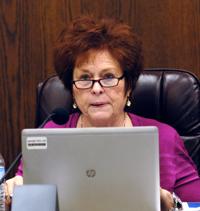PHOENIX — Rejecting claims it was ignoring the will of voters, a Senate panel voted Wednesday to alter the rules governing the use of vouchers of state dollars by parents to send their children to private and parochial schools.
Sen. Sylvia Allen, R-Snowflake, acknowledged many of the provisions in her SB 1395 were sent to voters last year as part of Proposition 305, which was rejected by voters by a 2-1 margin.
But Allen told members of the Senate Finance Committee she is not trying to override that vote. Allen said what’s in her bill wasn’t the focus of voters — or the cause of defeat for changes in the program formally known as empowerment scholarship accounts.
“What they were focused on and heard over and over again was this was expanding the program to all families, that rich people were going to benefit from these ESAs, and that this money was going to religious schools,” she said. All were part of Proposition 305.
Allen, however, insisted the legislation does not expand who is eligible for a voucher but simply clarifies who can and cannot get one, issues she said that have nothing to do with the expansion voters rejected. But Matt Beienburg of the Goldwater Institute acknowledged the bill, approved on a 6-4 party-line vote, would allow some children who are not now eligible for a voucher to get one.
At the heart of the debate is the use of public dollars for private education.
The original program approved in 2011 was designed to provide vouchers to students with special needs that could not be met in public schools. But voucher supporters have slowly widened the door to where it now includes foster children, children from reservations and children who attend schools rated D and F.
In 2017, lawmakers voted to remove all those restrictions, saying any student could get a voucher.
To get the votes, however, supporters had to agree to a cap of 30,000 vouchers by 2023 out of more than 1.1 million children attending public schools. But foes of expansion note that cap can be removed by a future Legislature.
Members of Save Our Schools Arizona argued that diverts tax dollars that otherwise would go to underfunded public schools. So they gathered the signatures to give voters the final say.
Voters sided with Save Our Schools last year and quashed the expansion. Now they see SB 1395 as an end-run around that.
For example, the current law spells out that a student has to attend a school rated D or F to become eligible for a voucher. SB 1395 would say simply living in the attendance area of a D or F-rated school is sufficient, even if the child goes to public school somewhere else.
There also are provisions that expand the age window for children to get vouchers for kindergarten programs as well as language entitling students to get vouchers until age 22.
And Dawn Penich-Thacker, leader of Save Our Schools, said the legislation also expands what parents who educate their children at home can purchase with their voucher dollars.
Right now the law says public dollars can be spent only on materials directly related to curricula, what has been interpreted as books. Beienburg said that bars parents from using their dollars for things like flash cards and globes.
But Penich-Thacker said the new language to allow purchase of “supplemental materials” is flawed.
“Is a Jet-Ski supplemental?” she asked. “Is an X-Box supplemental?”
Wednesday’s hearing also produced broader anger by some foes of SB 1395 to the whole premise of public dollars being used to send children to private schools — and especially religious schools.
“The financial burden lies on the individual and the faith community” to provide a religious education, said the Rev. Anne Ellsworth, an Episcopal priest, rather than using tax dollars that she said would be better spent on providing more dollars to public schools.
But Sen. J.D. Mesnard, R-Chandler, said vouchers allow parents to decide what education is best for their children.
“If a parent wants their child to have a religious education, for whatever reason … there’s obviously no way to do that within a public school,” he told Ellsworth. And he said parents need that option, as there is no way for parents to get that option in public schools, no matter how much they get in state funds.
Kathy Hoffman, the newly elected state superintendent of public instruction, also urged lawmakers to defeat the measure.
Aside from her assessment that voters rejected Proposition 305, Hoffman said complex questions of how best to deal with issues with vouchers should be left to a special task force she put together that features both supporters and foes.




